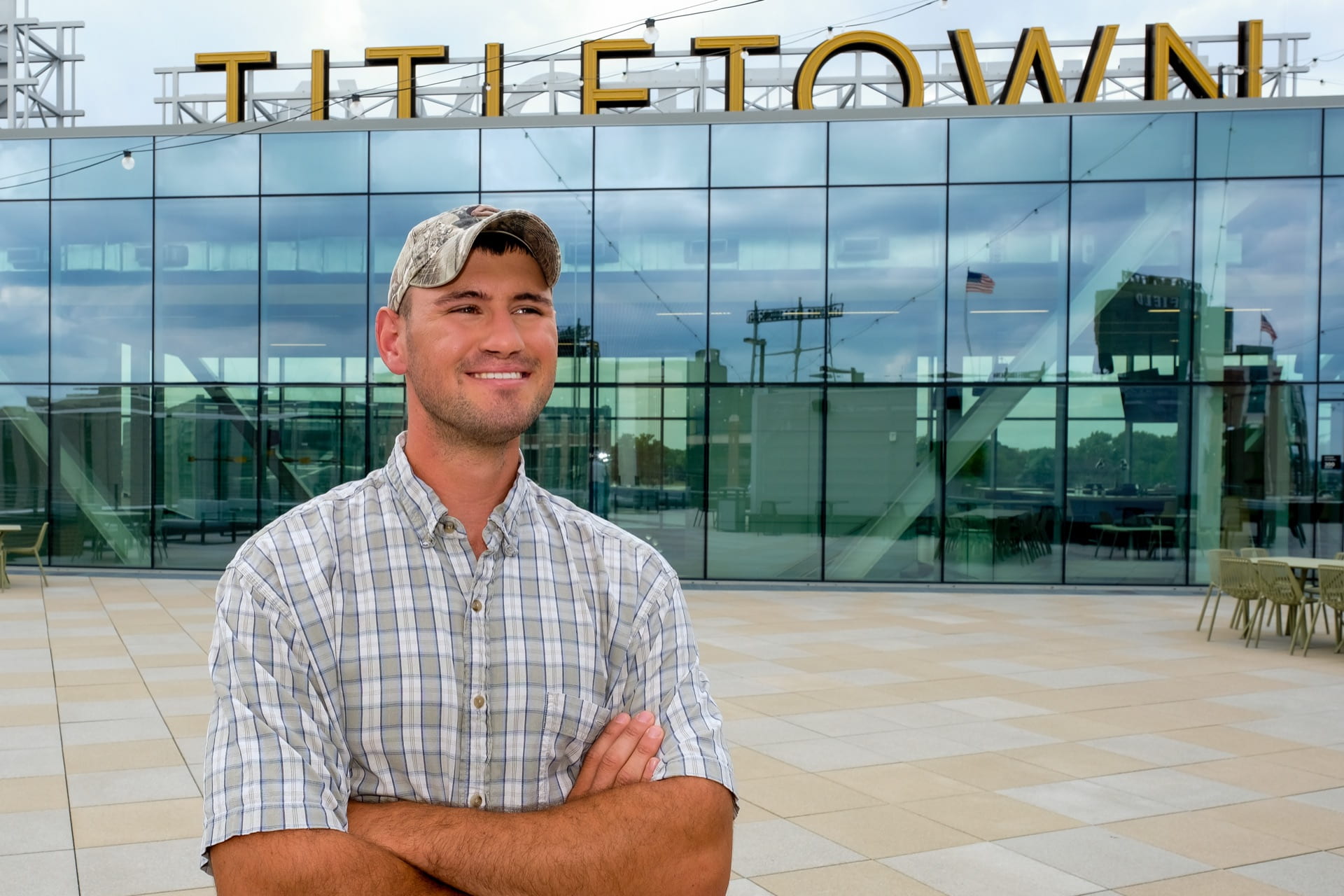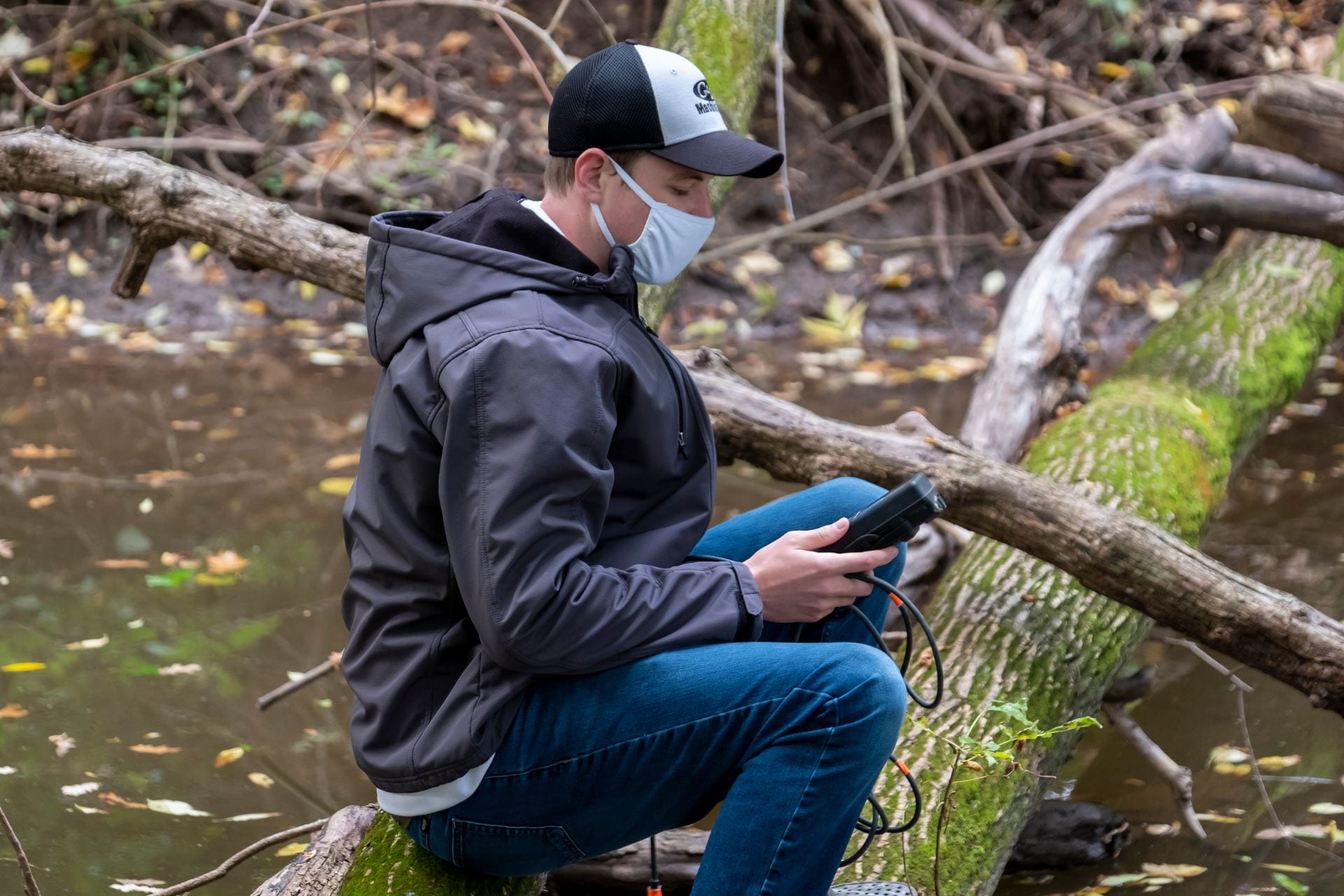UW-Green Bay graduate student works at sustaining the ‘family trees’

Patrick Brodhagen admits to being a hard worker. In fact, his to-do list would make young Abe Lincoln appear to be something of a slacker—attending graduate school, keeping up the family farm and launching a personal business.
“As soon as the frost goes out of the ground, I’ll be ramping up to 70 to 80 hours a week. When May comes around, it’s up to 90 for a couple of months. It’s a cycle.”
What keeps him going? A very persistent alarm and (just-don’t-call-it-work) ethic.
“A lot of people make fun of me because I’m actually a late sleeper.” Of course, “late” is defined within the parameters of Wisconsin’s dairy culture. “If I have to, I’ll wake up at 5:30 or 6. I’m usually wide awake by 7.”
Then it’s off to a typical 12-hour workday. “I’m not a morning person at all. I work a lot of hours, but I love every hour of it. I look forward to whatever it is I’m going to be doing, whether it’s working with my personal business or crop consulting. Every day I’m having fun.”
In the last two years, Brodhagen has added even more fun to his life—including completing graduate school course work in Environmental Science and Policy and launching his own business—Hickory Hill Forestry and Horticulture Services.
“It’s really a catch-all name so I could explore whatever I’m interested in.” What tends to interest Brodhagen most is being outside and working with farmers. During the last two years, it may be a combination of fresh air and uniquely agrarian social distancing that has helped keep him going.
“I work with a lot of farmers. They tell me—’Well, we’re either covered in dirt or cow manure so we’re not going to be that close to you anyway.’”
Hickory Hill Forestry is Brodhagen’s winter seasonal work. During the summer, he’s a crop consultant and plans on a career in agronomy. “I work with a lot of dairy farms with growing their crops, managing their manure, and helping them protect the environment, all while still being an efficient farm.”
Brodhagen also readily admits there’s another reason for his tremendous work ethic. “I want nice things and I’ve got to work hard for them. The main difference between a boy and a man is the sizes of the toys (equipment) we have.”
Among those “nice things” is purchasing his own family’s century-old 250-acre farm—a tradition that’s been handed through generations. “My grandfather bought it from my great-grandfather, my dad bought it from his father, so it’s my turn to buy it. I have to prove that I’m responsible enough and capable of taking it over.”
The fact that in 2005, his parents started a garden center on the family farm in which Brodhagen helped out from the age of six until his senior year in high school might be evidence enough. But it turns out, there are even limits to his capacity for cheerfully accepting a fresh “fun”—especially when college beckoned. “My parents asked me if I wanted to take over the business and I told them I was burnt out doing retail sales, it was time for me to explore new things.”
Not that he strayed far from the farm, choosing to attend UW-Green Bay as a commuting student for both his bachelor’s Environmental Science and Geoscience degrees, plus completing the graduate degree program in environmental science and policy researching groundwater contamination in southern Door County.
Brodhagen’s research objectives are to gain a greater understanding of where applications of manure or fertilizer should be managed to prevent water contamination and protect rural residents. His professional goal is to become an agronomist and consultant but he will never walk away from carrying on the family’s sustainable traditions.
“The name my grandfather gave the homestead in the late 1950s was Valley Tree Farm. When he retired from dairy farming, he converted three-quarters of the property into a tree plantation. Those trees are 30 to 40 years old, so now I’m taking care of it and doing the forestry work—trying to turn it back to its natural setting.”
Despite his formidable schedule, Brodhagen does confess to enjoying a hobby that helps him unwind after a long day. “When I get home, I usually split firewood until after dark. Sometimes until 10 p.m. Maybe it’s a country-boy mentality, but there’s nothing quite like chopping wood while watching the sunset and feeling the cool evening air roll in… it takes you back to a time when life was slower, simpler, and honest.”
Grandpa and Honest Abe would be proud.
What keeps you up at night?
The state of current world affairs keeps me up a little bit. I read before bed and each night I pick a different topic to learn about. I’m interested in so many things, I don’t have enough lifetime to learn it all. Right now, I’m learning how to propagate plants using cuttings.
What gets you out of bed in the morning?
A loud alarm! I’m not a morning person at all. I work a lot of hours, but I love every hour of it. I look forward to whatever it is I’m going to be doing, whether it’s my personal business or crop consulting in the summer. Every day I’m having fun. When I’m working, I’m relaxing because I enjoy it. I know a lot of people don’t think about work that way.
Why will you never stop learning?
My motto is: “The day you stop learning is the day you start dying.” That’s what my grandpa taught my dad and what my dad taught me.
What’s the last lesson life taught you?
Everything happens for reason. Here’s a short story for an example: I had made a trailer load of firewood and I was going to stack it over by my barn. The frost went out and I buried my truck in the mud. And of course, our tractor was out for service, so I didn’t really have anything to pull it out. In situations like that, you might just sit there scratching your head and maybe you want to say a few bad words. Then the next day, someone messaged me because they wanted to buy some firewood. If I hadn’t gotten stuck, he would’ve come over and he would have gotten stuck. We ended up rescheduling the pick-up for when it was less muddy. I let the truck sit for a day and let the water drain away. It took a couple of hours, but I got out. Moral of the story: even during the worst situations, there is always a reason why it is happening; we don’t always recognize or appreciate it right away, but there’s always a reason.
How has education ignited your personal growth?
Going to college teaches you how to learn and how to teach yourself. In high school, you learn a lot of basic information and facts. College teaches how to learn on your own. Knowing where to go for information and what information to trust, why you should trust it, and why you shouldn’t trust it.
How has education opened doors for you?
Education has helped me make a lot of connections. When I first attended college, just talking to professors increased my self-esteem and confidence. The experience also increased my professionalism as I talk to other people outside of college as a peer, not just as a student. My college experience at UW-Green Bay has been amazing.
How has education leveled the playing field?
A lot of people go to college not knowing what they want to do, but you can still learn lots of skills from a wide group of people that you couldn’t on your own. In my case, Calculus II was my most challenging class. But you never know who or what you might get a chance to learn from or to teach. For example, I worked with another student in the natural areas on campus. He had grown up in the city and never learned to use a chainsaw, so I showed him. Going to college lets you learn all sorts of skills. Education allows you to learn skills that you may not have otherwise learned at home or from prior occupations.
What do you think is education’s biggest challenge?
I think it’s important that students have the connections they need with potential employers after college. We need more outreach by colleges to high school advisors to keep them up to date on information about where the demand is for jobs. I think there’s still a disconnect between graduating high school, entering college, having some idea of career trajectory, and understanding the market demand for specific skillsets. Many kids start college without knowing what they really want to do for a career; a strong communication link between colleges and high school advisors can help minimize this uncertainty and put students on the right track from day one. In the long run, this will fast-track college, save the students money, and successfully get more students into the careers they love.





